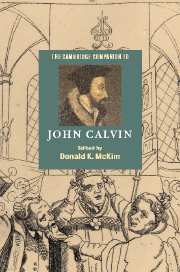Book contents
- Frontmatter
- Part I Calvin’s Life and Context
- Part II Calvin’s Work
- 3 Calvin’s writings
- 4 Calvin as a biblical interpreter
- 5 Calvin’s theology
- 6 Calvin’s ethics
- 7 Calvin’s preaching
- 8 Calvin on piety
- 9 Calvin and social-ethical issues
- 10 Calvin and political issues
- 11 Calvin’s controversies
- Part III After Calvin
- Part IV Calvin Today
- Select bibliography
- Index
9 - Calvin and social-ethical issues
from Part II - Calvin’s Work
Published online by Cambridge University Press: 28 May 2006
- Frontmatter
- Part I Calvin’s Life and Context
- Part II Calvin’s Work
- 3 Calvin’s writings
- 4 Calvin as a biblical interpreter
- 5 Calvin’s theology
- 6 Calvin’s ethics
- 7 Calvin’s preaching
- 8 Calvin on piety
- 9 Calvin and social-ethical issues
- 10 Calvin and political issues
- 11 Calvin’s controversies
- Part III After Calvin
- Part IV Calvin Today
- Select bibliography
- Index
Summary
No successful reformer of the sixteenth century could ignore the needs of the society in which the reform took place, for the educational and welfare needs of people continued after the Reformation. Before regions became Protestant, the Catholic Church had funded schools and charity through its parishes and institutions. Catholic priests and nuns had staffed schools and hospitals and administered welfare. Catholic confraternities of lay and clerical members had engaged in charitable activities. There had been some centralization of welfare in lay and government hands, but to a large extent, schools and hospitals were run by the church and its clergy.
When regions became Protestant, the property and endowment of the Church of Rome and its institutions shifted over to the governments of the cities, regions, or nations that became Protestant, but some of it was lost to private hands in the process. Priests and nuns were asked to leave or to accept no new novices. Money was needed for staffing. Protestant regions needed to rebuild a new infrastructure in education and welfare.
The Protestant reformers set out to establish a permanent institutional base for the Reformation and improve on what had gone before. Just as Luther influenced millions through his writings and established a base for the Reformation through the reform of the University ofWittenberg and the founding of Protestant universities and secondary schools, so John Calvin’s influencewas implemented through the founding of the academy in Geneva that later became the University of Geneva.
- Type
- Chapter
- Information
- The Cambridge Companion to John Calvin , pp. 153 - 172Publisher: Cambridge University PressPrint publication year: 2004
- 1
- Cited by

